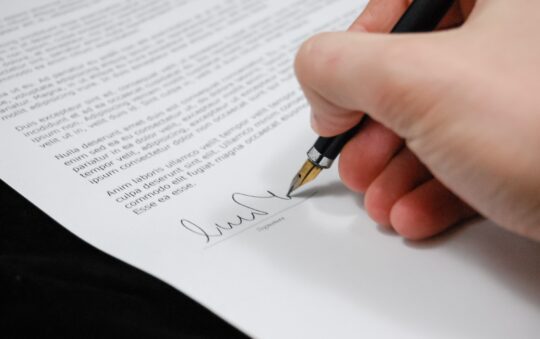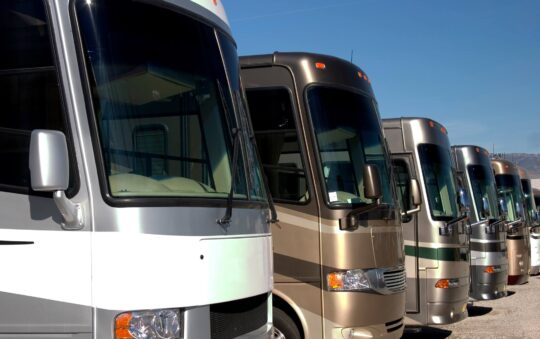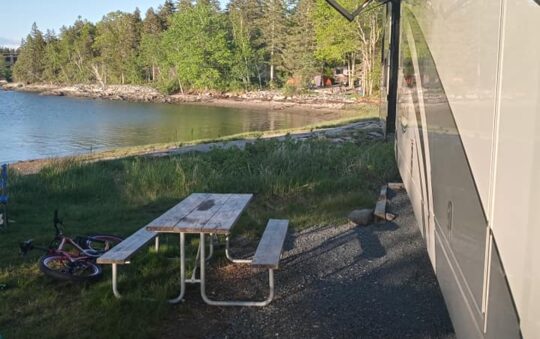RVing is a wonderful way to explore the great outdoors and spend quality time with family. However, it can also be dangerous if you are not aware of the common mistakes RVers make. From failing to check their safety equipment before heading out on the road, to forgetting to secure items inside their vehicle before driving off, many potential pitfalls might lead an RVer into danger. In this article, we will discuss some of the RV mistakes to avoid and help RVers stay safe while enjoying their outdoor adventures. By avoiding these common RV mistakes, you can ensure a safe and enjoyable trip for your family and those around you.
1. Not Checking Propane Level
One of the biggest RV mistakes to avoid is not checking your propane level regularly. Propane is essential for many items in your RV, and running out can put you in a dangerous situation if you’re camping without electricity or other fuel sources. While it may seem like an easy thing to overlook, checking the propane level should be part of your routine when traveling with an RV.
Why check your propane levels?
First, it’s important to understand why you need to check your propane levels. Propane is a combustible fuel, which means it can be dangerous if not handled properly. The level of the tank needs to be monitored so that the pressure does not become too high or low. If there is too much propane in the tank, it could overheat and cause an explosion. If there isn’t enough propane, then you won’t have enough power to operate certain appliances in your RV such as the stove, refrigerator, water heater, and furnace.
Tips for proper propane monitoring
To avoid running out of fuel or putting yourself at risk of a potential hazard, here are some tips on how to properly monitor and maintain your propane levels:
- Make sure to check the level of your propane tank each time you fill up or before going on a long trip.
- Periodically check for any signs of leaks in the lines and connections, including checking for the smell of gas. If there is a leak, make sure to turn off the tank immediately and contact a professional to help locate and repair it.
- Store your propane tanks away from sources of heat such as grills, campfires, and other sources that could cause ignition.
- Regularly inspect hoses, valves, and regulators for signs of wear or damage.
By following these simple tips and monitoring your RV’s fuel levels regularly, you can avoid running out of propane and help ensure your safety.
2. Leaving Your Awning Open
When you’re out on the open road in your RV, it can be easy to forget about some of the safety measures that come along with traveling with a recreational vehicle. One common mistake made by many RVers is leaving their awning open when they leave for the day, which can lead to serious damage and potential hazards if left unattended. We’ll discuss why it’s important to always keep your awning closed while away from your RV and how you can avoid making this costly mistake.
Weather damage to RV awnings
Awnings are meant to protect you from the sun, wind, and rain while you’re out on the road. When left open, they can become a hazardous obstacle if forgotten about. Not only do they create an eyesore as they flap in the wind, but they can also be dangerous if left unattended for an extended period. Strong winds can cause damage to your RV or even rip off their brackets from the side of your vehicle if not taken into account. Additionally, when left open, awnings are susceptible to debris and material buildup which can become quite heavy over time and cause further damage to your RV and its attachments.
Always double-check your awning
To avoid making this mistake, it’s important to always double-check that your awning is closed before leaving for the day. Additionally, it’s recommended to always tie down any loose items such as umbrellas and chairs that may be under the awning when not in use. This will help keep them from becoming hazardous obstacles should you forget about them during windy conditions. Finally, if possible, consider investing in an awning cover or tarp to prevent material buildup and further protect your investment while on the road.
The takeaway message here is: Always double-check your awning before heading out for the day and, whenever possible, invest in an awning cover or tarp to further protect your RV. Doing so can help with RV mistakes to avoid.
3. Driving Too Fast

Making mistakes in your RV can be costly, and even dangerous. One of the most common errors that RVers make is driving too fast. Whether you’re new to the RVing lifestyle or a seasoned pro, it pays to stay mindful of this mistake and how to avoid it.
Driving too fast in an RV can be particularly dangerous for a few reasons. RVs are significantly larger than cars, and thus require more time to come to a complete stop. They also have higher centers of gravity and can be prone to tipping over if driven too quickly around curves and turns. Additionally, the added weight of an RV means that it will take longer to accelerate or decelerate, which is why it’s important to always drive at a safe speed limit.
To ensure your safety while driving an RV, here are some sensible tips:
- Always obey posted speed limits – these limits exist for a reason!
- Be aware of the weather conditions – wet and icy roads can cause your RV to skid or hydroplane.
- Keep your tires properly inflated – over or underinflated tires can cause accidents and loss of control.
- Take extra caution when driving on hills – sudden braking can cause the vehicle to slide.
By following these simple tips, you can avoid making a potentially dangerous mistake while traveling in your RV! Be sure to always drive at a safe speed limit, obey posted signs, and take extra precautions when the roads are wet or icy.
4. Leaving Your Black Tank Open
As an RVer, you may have heard of the importance of closing your black tank valve when camping. However, this isn’t always done and can lead to serious consequences. Leaving your RV’s black tank open is one of the common RV mistakes to avoid and it can cause some major issues if not properly addressed.
Waste Buildup
First and foremost, leaving your black tank open can cause the waste to back up into other parts of the RV. This is especially true when you’re parked on an incline, as gravity will cause the liquid waste to flow upward if the valve isn’t closed. If this happens, it could lead to a major mess inside your RV—not something anyone would want! Furthermore, leaving the black tank open could also allow odors to escape and make their way throughout the interior of your vehicle.
Black tank issues may pose a health risk
Aside from causing potential problems inside your RV, leaving the black tank open can also be dangerous for other campers in the area. It is possible that any gray water leaking from an open valve could contaminate nearby groundwater and lead to health risks. Therefore, all RVers must take the necessary precautions to ensure their tanks are properly secured when parked.
Just close your valve
Thankfully, avoiding mistakes like leaving your black tank open is relatively easy. All you need to do is make sure to close your valve every time you’re finished using the restroom in your RV. Additionally, it’s a good idea to check regularly for any signs of leakage or other damage that could be caused by not closing the valve properly each time. Taking these simple steps will help ensure your safety as well as that of other campers around you!
5. Forgetting To Check Your Slide Clearance
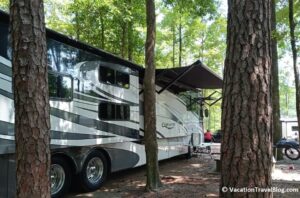 Making sure your RV has the proper slide clearance is a crucial part of owning and operating an RV. It’s a safety issue, as well as something well looked after that fixes RV mistakes to avoid and will help you enjoy a more comfortable trip. Unfortunately, many RVers make mistakes when it comes to this important task. Here are some common things you can check to ensure your RV has the correct slide clearance.
Making sure your RV has the proper slide clearance is a crucial part of owning and operating an RV. It’s a safety issue, as well as something well looked after that fixes RV mistakes to avoid and will help you enjoy a more comfortable trip. Unfortunately, many RVers make mistakes when it comes to this important task. Here are some common things you can check to ensure your RV has the correct slide clearance.
Not Checking Clearance Before Moving
It’s important to take a few moments to measure the slide clearance of your RV before you move it, especially if you are in an unfamiliar area. Make sure you have enough space for your slides to extend without hitting any trees, poles, or other obstacles.
Not Accounting For Uneven Ground
When checking the clearance around your RV, make sure to also account for any tilt in the ground. If there is a slight slope that can affect the overall height and width of the area, then your slide may not be able to extend as far as it should and may present problems when you try to retract it.
Not Allowing For Adequate Slide Extension
Many RVers don’t allow enough space for their slides to extend as far as they should. Make sure you leave yourself several feet of clearance so that your slide can open completely and safely.
Ignoring Objects Above Your Vehicle
Many RV enthusiasts forget about objects above the vehicle, such as trees or power lines, when checking their slide clearance. Be aware of potential obstacles in the air just as much as you are aware of the terrain below. I can tell you from experience I have had a good side-to-side clearance but low-hanging branches have impeded my slide – don’t forget this step!
Not Checking Clearance After Every Stop
Even if you checked your slide clearance before you departed your previous location, it’s important to check it after every stop while on the road. Make sure that no new objects have been placed in your path or that any changes in terrain have not affected the overall height and width of the area around your RV.
By taking a few extra moments at each stop to check for proper slide clearance, you can help ensure a comfortable and safe trip for yourself and your passengers. Doing this will also help prevent any unnecessary damage to your RV or its slides.
6. Not Checking your Tire Pressure
One of the most common mistakes that RVers make is not checking their tire pressure regularly. Whether you’re driving a motorhome or towing a trailer, it’s essential to check your tires before every trip and at least once a month when you are parked. Not doing so can be dangerous and lead to costly repairs down the road. In this section of our article, we will discuss why it’s important to check your tire pressure and why it is one of the most important RV mistakes to avoid.
Take your RV weight into account
When traveling in the RV, the weight of the vehicle can cause your tires to become overinflated or underinflated. This is because the extra weight causes more pressure on the tires which can lead to them being either too tight or too loose. If you don’t check your tire pressure regularly, this can be dangerous and cause serious accidents. It is also important to note that different types of tires need different levels of pressure. Therefore, it is essential to read up on what type of tire you are using and make sure they are inflated properly according to their specific requirements.
Establish a tire pressure check routine
It is recommended that RVers check their tire pressure at least once a month when parked and before every trip. You should also get in the habit of checking your tire pressure each time you fill up with fuel. This will help to ensure that your tires are properly inflated and can prevent costly repairs or even accidents down the road.
Tire Pressure Issues can cause uneven tire wear
If your tires are not properly inflated, it can cause them to wear unevenly, which can lead to premature wear and tear on the tire treads. Additionally, not having enough air in your tires can cause them to heat up quickly while driving and this could be dangerous if they overheat. On the other hand, if there is too much air in your tires, they may become too stiff and can be more prone to punctures or blowouts.
Stay on top of your tire maintenance
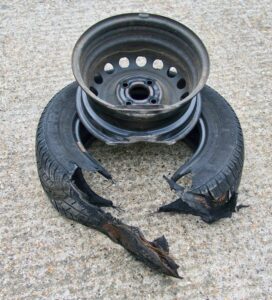
All in all, RVers need to check their tire pressure regularly to ensure their safety and prevent costly repairs. To have the best RV experience possible, make sure to follow safe practices and never forget the importance of checking your tire pressure regularly. It’s a small but important step towards ensuring your RV is running at its peak performance, as well as providing you with peace of mind while traveling. Be sure to stay on top of tire maintenance and happy RVing!
7. Not Looking at the Weather Reports
When it comes to RVing, many mistakes can be made. One of the most common and potentially dangerous RV mistakes to avoid you can make is not checking the weather reports before heading out on your trip. Weather forecasts contain important information about current conditions and potential hazards that may affect your journey. Failing to look at these reports could put yourself and your family in danger, so you must take the time to check them before your trip departure.
Know the signs of bad weather
When planning an RV trip, it’s important to know what kind of weather to expect in your area. While  some days may be sunny and clear, there are also days when storms or other types of severe weather can occur. It’s important to be aware of any potential hazards that could affect your journey, as well as any areas that could be affected by bad weather. Additionally, knowing how to identify the signs of bad weather can help you to better prepare for it and stay safe on your trip.
some days may be sunny and clear, there are also days when storms or other types of severe weather can occur. It’s important to be aware of any potential hazards that could affect your journey, as well as any areas that could be affected by bad weather. Additionally, knowing how to identify the signs of bad weather can help you to better prepare for it and stay safe on your trip.
Check multiple weather sources
When checking the weather reports, make sure to look at multiple sources to get an accurate picture of what the conditions are like. This could be checking local television and radio stations, looking at the National Weather Service’s website for conditions in your area, or using a mobile weather app. It may also be a good idea to check into a weather radio. Checking all of these sources can help to ensure that you have an up-to-date picture of the current conditions and potential hazards that may affect your journey.
Another mistake that RVers make is neglecting to check their vehicle before they leave. Ensuring that all systems are functioning correctly and that all safety equipment is in place can be the difference between a successful trip and an emergency situation. Making sure your tires, brakes, and other important parts of your RV are working properly will help you get the most out of your journey and stay safe on the road.
Wrapping Up All of the RV Mistakes to Avoid
RVing can be an incredibly rewarding and enjoyable experience, as long as you take the necessary precautions to ensure your safety. By following the helpful tips outlined in this article, we hope that you learned more about RV mistakes to avoid and found this information useful. We have learned a lot over our nearly 10 years of RVing and love to share what we have learned with other people! Hopefully, taking these steps will help you avoid dangerous situations. With these tips in mind, we hope you’ll be able to plan an unforgettable adventure with minimal stress and hassle! To find more useful RV tips, use our the home page of vacation travel blog as your starting point.


